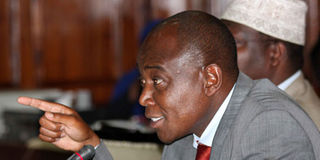PM's office urges House to reject nominees

Prime Minister Raila Odinga's aides Caroli Omondi and Miguna Miguna (partly hidden) appear before the Parliamentary committee on Justice and Legal Affairs February 9 2011. They urged Parliament to throw out President Kibaki’s nominees to four constitutional offices.TOM MARUKO
The Prime Minister’s Office has urged MPs to throw out President Kibaki’s nominees to four constitutional offices.
The PM’s Chief of Staff, Mr Caroli Omondi and the PM’s advisor on coalition affairs, Mr Miguna Miguna, rallied the committee members to reject the names terming the President’s list as a result of an unconstitutional procedure. The duo echoed the PM’s remarks that there were no consultations prior to the nominations.
“If you find that the decision was not consistent with the Constitution, then you should reject it,” said Mr Miguna. “Had the Prime Minister submitted names to Parliament, would Parliament have accepted them, because this is a coalition government? If the answer is ‘no’, then what’s the basis of going ahead with this nominations?”
Besides, Mr Omondi told the committee that the question of constitutionality of the nominations was not a matter of the House to vote on.
They cited the Speaker’s ruling and even attempted to tell the committee that they ought not go ahead with the exercise before, in the first place, determining the constitutionality of the issue.
“We don’t think Constitutional interpretation can be determined through voting in any organ,” Mr Omondi insisted.
The PM’s team told the committee that in the light of complaints in the Executive that Parliament had taken over the power of recruitment and approval under the coalition agreement, he advised the principals, together with the President’s Constitutional adviser, Mr Kivutha Kibwana, to go ahead with the nominations.
Mr Omondi told the committee that the Principals’ intention was to go for the “White House model where people are identified and recruited competitively.”
But he said the PM was presented with a list that was never amended in the discussions and was not even allowed to propose names.
“The PM never even had the opportunity to give the women of this country a chance, and that’s why we’re here,” the PM’s Chief of Staff said.
“When we look back, probably it was the wrong decision and we’ve no problem changing tack.”
Unlike the President’s men who had told the committee that the matters could be handled differently, in a freestyle manner to side-step and even minimise the potential for conflict; the PM’s team said there ought to be a structured mode to look at the threshold of consultations.
“Probably we’ve learnt something, that things ought to be more structured,” said Mr Omondi. Mr Omondi spoke about a plot by Prof Nick Wanjohi to have him accept that the Principals will push the Judicial Service Commission to appoint Lady Justice Hannah Okwengu as Deputy Chief Justice.
He said he rejected this because there was not an agreed criteria of how the appointments would be done.
“We think what’s at issue here is the constitutionality of this nominations. Their constitutionality is a function that goes beyond nominations,” said Mr Omondi.
The two urged National Assembly Speaker, Mr Kenneth Marende, to rule that the matter was unconstitutional, because, just like the Attorney General has the final say on legal matters in the Executive, the Speaker held the key in resolving constitutional matters in the legislature.
They tabled a list of officials in the State Law Office and urged the committee to check their backgrounds. The names were not mentioned and the list was not made public.
However, they cited the National Cohesion and Reconciliation Act saying “all public establishments shall seek to represent the diversity of the people of Kenya in the employment of staff.”
“ No public establishment shall have more than one third of its staff from the same ethnic community,” added Mr Omondi quoting section 7(2) of the Act.
The duo from the PM’s office urged the committee members to consider the views of the Commission for the Implementation of the Constitution, the Judicial Service Commission and the High Court ruling.
They urged the committee to consider the CIC views as “binding” because of its standing in the process of rolling out the new Constitution.




